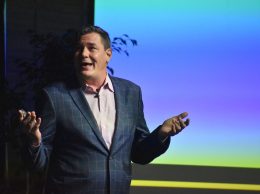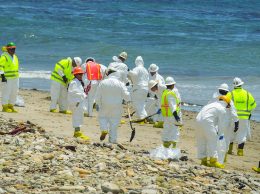San Luis Obispo County oil operator weighs spin off or sale
IN THIS ARTICLE
- Central Coast Topic
- pacbiztimes Author
By pacbiztimes Friday, October 16th, 2015
Freeport-McMoRan is looking to expand its oil and gas production in San Luis Obispo County even though it’s rethinking strategy and may sell or spin off operations.
The Arizona-based oil, copper and gold producer wants to add 350 new wells and replace 100 in the Arroyo Grande oil field off Price Canyon Road. It currently has about 165 active wells producing about 1,350 barrels daily, which are trucked to the ConocoPhillips refinery in Santa Maria.
The closure of pipeline 903, which is owned by Plains All American Pipeline, the company responsible for the Refugio oil spill, has significantly decreased Freeport’s production.
Freeport sends the production from its Point Arguello Unit (platforms Hidalgo, Harvest and Hermosa) through Line 903 to the Santa Maria refinery. It moves oil from the Point Pedernales Unit (Platform Irene), as well as the production from the onshore Lompoc oil field, through the Phillips 66 line.
If the Arroyo Grande project is approved, it would increase production to about 6,000 barrels a day and add about 50 to 60 jobs.
But Freeport is “reviewing strategic alternatives” for all of its oil and gas operations, the company announced on Oct. 6.
It is weighing a potential public offering of a minority interest in its oil and gas business, spinning it off to its shareholders, arranging a joint venture deal and/or further spending
reductions, according to a news release.
A company spokesman would not confirm whether the strategy review would impact its planned oil field expansion.
“We won’t speculate on any of these matters,” Freeport spokesman Eric Kinneberg said.
Freeport is struggling because oil and copper prices are low. But the company estimates in its second-quarter earnings report that copper prices will rebound.
Oil companies throughout the region are looking to cut costs as oil prices remain low. Texas-based energy company ConocoPhillips recently announced that it will cut about 10 percent of its 18,000-plus workforce.
Freeport is getting flack for proposing to inject leftover water from drilling into part of a protected aquifer to accommodate its anticipated well expansion.
Once oil is extracted, it is separated from the water and the wastewater, or produced water, is reinjected into the oil formation. Freeport is applying to exempt a larger portion of the aquifer in the oil field from the Safe Water Drinking Act.
Freeport says that the groundwater in the aquifer is not a source of drinking water and will not be one in the future. The state Division of Oil, Gas and Geothermal Resources and the Central Coast Regional Water Control Board both agree and recommend the exemption’s approval.
But Freeport hasn’t done enough to prove the entire aquifer is an oil-bearing zone, said Maya Golden-Krasner, an attorney for the Center for Biological Diversity, an environmental nonprofit based in Arizona.
Residents who border the oil field, like Natalie Beller, don’t think they should rule out any source of potential drinking water.
“Someday the technology will exist to use the water in this aquifer for human purposes,” Beller told the Business Times. “But, the more it’s polluted, the less likely we’ll be able to use it for drinking.”
Beller worries the exemption would contaminate nearby sources of potable water. As of now, she doesn’t drink or cook with any of her well water.
“I am looking to relocate my family to another home,” she said. “It’s too risky to live where we are.”
Freeport hired San Luis Obispo-based consulting firm Cleath Harris Geologists to study potential contamination. It did not find any signs that the groundwater wells within a mile of the Arroyo Grande field were tainted.
“There is no evidence that injected fluids have migrated beyond the confines of the reservoir after decades of injection operations,” the exemption application reads.
The U.S. Environmental Protection Agency will ultimately decide if the exemption goes through.
DOGGR, the statewide agency that inspects the oil wells, recently announced plans to overhaul its organization. It cited systemic issues that resulted in permitting oil companies to drill wells and begin injecting fluid underground without undergoing contamination assessments.
“The overhaul of the industry is driven by its failure to protect the water supply,” said Patrick Sullivan, media coordinator for the Center for Biological Diversity. “The state is not doing its due diligence. It’s far too quick to take oil industry’s word and not doing enough to protect our water.”
• Contact Alex Kacik at [email protected].











